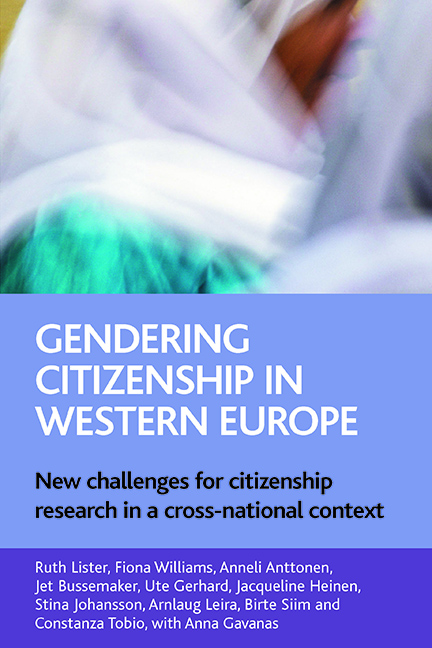 Gendering Citizenship in Western Europe
Gendering Citizenship in Western Europe Introduction
Published online by Cambridge University Press: 15 September 2022
Summary
Citizenship links the individual with the collective. This book too is the work of individual researchers who have worked collectively as an international team. The outcome is therefore not the more usual edited collection in which authors of individual chapters work with an editor. Rather it is the product of a collaborative process of iteration in which authors responsible for individual chapters have drawn on material provided by the whole team and members of the team have discussed and commented on each chapter. This process has helped to illuminate some of the challenges faced in researching citizenship in a cross-national context.
The introduction begins with an explanation of why it is necessary to understand citizenship in context. This is followed by a brief account of the meanings of citizenship and of feminist interpretations of them and, finally, an overview of the volume.
Citizenship in context
Citizenship can be understood both as an academic and political concept and as lived experience (Lister, 1997, 2003; Siim, 2000). Our analysis highlights three key elements of citizenship: rights and responsibilities, belonging and participation. The starting point for the volume and central theme running through it is that context matters. Although, as a concept, citizenship is typically constructed in abstract, universal terms, the universal nevertheless is interpreted and articulated in specific national social and political contexts, reflecting historical traditions and institutional and cultural complexes. Thus, for example, the British literature on citizenship has traditionally tended to focus on the relationship between individual citizens and the state, central to its liberal tradition; in contrast, the Scandinavian literature has been more likely than the British to emphasise the relations between citizens as a collectivity, reflecting the feelings of solidarity emanating from a long history of social democracy.
As lived experience, citizenship cannot be divorced from its context – temporal and national. Diverse aspects of gendered citizenship are salient at particular periods of time in different countries (see Chapters One and Two). Indeed, understandings of what it means to be a citizen, and the vocabularies used to capture these meanings, are likely to differ to some extent between European countries, as discussed in Chapter One. Moreover, within countries people may experience citizenship differently depending on factors such as age, class, ethnicity, religion, gender, sexuality and (dis)ability. These factors interact to weave the texture of lived citizenship for individual citizens (see also the Conclusion).
- Type
- Chapter
- Information
- Gendering Citizenship in Western EuropeNew Challenges for Citizenship Research in a Cross-National Context, pp. 1 - 14Publisher: Bristol University PressPrint publication year: 2007


